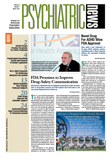It would be too much to hope that an over-the-counter dietary supplement might help treat bipolar and other psychiatric disorders, and that appears to be the case.
Omega-3 fatty acid supplementation has been suggested to alleviate symptoms of several psychiatric disorders, but results have generally proved inclusive, according to a number of studies. However, a small, open-label study claims to have found some improvement in manic symptoms in children with bipolar illness.
Conventional mood stabilizers such as lithium, divalproex, or carbamazepine may cause unacceptable side effects and subsequent poor compliance when prescribed for young patients.
The trial tested a commercial formulation of omega-3 fatty acids for eight weeks in 20 outpatients aged 6 to 17 years. To be eligible, the patients had to record a score over 15 on the Young Mania Rating Scale (YMRS) and not be taking any mood stabilizer, anticonvulsant, antidepressant, or neuroleptic pharmacotherapy. Psychostimulants were permitted, if clinicians deemed it appropriate. Nondrug therapies could be continued but not initiated during the trial. Study clinicians diagnosed each patient in the trial according to DSM-IV criteria.
Each gel cap of the study drug contained 375 mg of eicosapentaenoic acid (EPA) and 55 mg of docosahexaenoic acid (DHA). Dosing began at three capsules a day and could escalate to 10 a day. Mean dosage at the study's end was 2,600 mg/day.
Ten subjects (50 percent) had baseline YMRS scores reduced by 30 percent, and there was an average 8.9 point drop at the end of eight weeks. However, the subjects remained symptomatic. Scores on the Brief Psychotic Rating Scale and the Children's Depression Rating Scale declined, too.
“Given the modest level of improvement in this open-label study, the likelihood exists that nonspecific study effects were responsible for the improvement,” wrote Janet Wozniak, M.D., an assistant professor of psychiatry at Harvard Medical School and director of the Pediatric Bipolar Clinical and Research Program in Pediatric Psychopharmacology at Massachusetts General Hospital, and colleagues. Their study was published online ahead of print in the January 25 European Neuropsychopharmacology.
The authors cited previous research suggesting that the fatty-acid composition of the phospholipids of cell membranes may affect neurotransmitter receptors. They also ask if dietary deficiencies of omega-3 fatty acids in bipolar youth may offer an opening for treatment.
Several systematic reviews of omega-3 fatty acid supplementation have been published in the last year and concluded that its effectiveness for the treatment of depression or bipolar disorder remains mixed or inconclusive. A review by Australian researchers in the June 2006 American Journal of Psychiatry said that much work needed to be done on selecting outcome measures, appropriate placebos, concurrent psychot ropic medicat ions, dosage levels, and fatty-acid composition of the supplement to develop useful clinical trials.
An abstract of “Omega-3 Fatty Acid Monotherapy for Pediatric Bipolar Disorder: A Prospective Open-Label Trial” is posted at<www.ncbi.nlm.nih.gov/entrez/query.fcgi?db=pubmed&cmd=Retrieve&dopt=AbstractPlus&list_uids=17258897&query_hl=7&itool=pubmed_docsum>.“ Omega-3 Fatty Acids and Mood Disorders” is posted at<http://ajp.psychiatryonline.org/cgi/content/abstract/163/6/96>.▪
